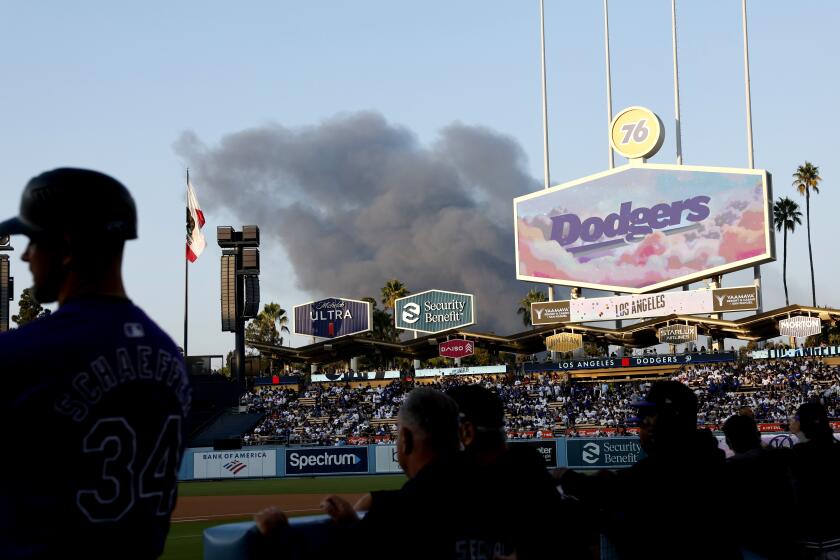Decision on Closing Hospitals Delayed
Los Angeles County health officials opted Monday to delay a vote scheduled for today on whether to close two of the county’s four full-service public hospitals, despite earlier pledges to address the issue immediately because of a looming deficit.
The Board of Supervisors had been set to vote on whether to turn Olive View-UCLA and Harbor-UCLA medical centers into outpatient facilities but backed off amid unwavering criticism from other politicians, medical groups and patients’ advocates.
Just a week ago, a board majority said supervisors would resist such pressure and proceed with the vote because the Department of Health Services faces a shortfall of $500 million to $750 million in three years.
Under a proposal released late Monday, the health department wants the vote rescheduled for Nov. 19. Supervisors still are expected to discuss a recommendation today to reduce the county’s flagship County-USC Medical Center from 745 to 695 beds.
The board also will consider a recommendation to close Rancho Los Amigos National Rehabilitation Center, a nationally recognized rehabilitation hospital in Downey that treats about 42,000 people annually. Many have severe trauma injuries and disabilities and about 30% are indigent.
Supervisors have repeatedly postponed major cuts to the county’s health-care system, despite demands for reform from the federal government, which has provided more than $2 billion in bailouts since the mid-1990s.
“We have had five years to begin those cuts,” Supervisor Michael Antonovich said last week. “Every day that we delay means dollars being taken out of other vital services.”
But Dr. Thomas Garthwaite, the new director of the Department of Health Services, said Monday that this latest delay is prudent because several efforts are underway to improve the health department’s financial prospects.
“I don’t want to see two of our hospitals close, so I feel like it’s to all of our advantages to explore every avenue to see if we can prevent that,” Garthwaite said. “If these were hospitals with a lot of vacant beds, I wouldn’t be telling you that. We want to continue to deliver care.”
One partial solution rests with county voters next Tuesday, Garthwaite said. They are being asked to approve a parcel tax that would pump $168 million annually into the county’s emergency- and trauma-care system. If approved, the tax would cost the owner of an average-sized property -- about 1,400 square feet -- $42.66 a year.
One day after the election, Garthwaite said, a top federal health official, Tom Scully, is to visit Harbor-UCLA near Torrance and to meet with county officials to discuss possible financial assistance. Scully, administrator of the U.S. Centers for Medicare & Medicaid Services, has said he opposes the county’s current request for a $1.4-billion bailout, but he is open to giving some help.
Scully had asked supervisors to delay today’s vote, saying in a recent interview that it was “an artificial date picked for artificial reasons.”
Gov. Gray Davis, too, supported a postponement of decisions on hospital closings. He has said that he will decide next month whether to call a special legislative session to discuss the county’s health-care deficit.
Supervisor Don Knabe, who asked to delay the vote, said he was pleased that county officials would have time to explore their options without the cloud of closings hanging over their heads.
“There’s a lot of things going on that we don’t know the results of yet,” Knabe said.
Supervisor Zev Yaroslavsky, who last week opposed any delays, said he had been assured by county health department officials that the postponement won’t add to the deficit. But if voters approve the parcel tax, known as Measure B, they could save both Harbor and Olive View, Yaroslavsky said.
Measure B, he said, appears short of the two-thirds support it needs to pass, but polling shows it is “within striking distance.”
In June, the supervisors approved an initial round of health department cuts, closing 11 health centers and four school-based clinics. Supervisors also cut public-health spending by about 10% and agreed to convert High Desert Hospital in the Antelope Valley into an outpatient clinic in May 2003.
At two news conferences Monday, elected officials implored supervisors not to proceed as scheduled with more severe cuts.
Speaking outside Olive View’s emergency room in Sylmar, Assemblyman Keith Richman (R-Northridge) said that any closing would only create more chaos at other emergency facilities.
“The county’s financial plight not only threatens the health of millions of low-income residents who depend upon it for care, it also puts a heavy strain on Southern California’s private health-care system,” said Richman, a physician.
A vote to close Harbor-UCLA and Olive View would have been “foolhardy, shortsighted and, in my view, really frankly irresponsible,” said Assemblywoman Jenny Oropeza (D-Long Beach) at a separate news conference outside the county Hall of Administration.
Los Angeles City Councilwoman Janice Hahn said that closing two major hospitals would have discouraged voters from approving Measure B.
“Let’s not begin pulling the plug on this system,” she said. “Let’s give it life support. Let’s wait for things to work before we begin specifically naming hospitals that will close.”
More to Read
Sign up for Essential California
The most important California stories and recommendations in your inbox every morning.
You may occasionally receive promotional content from the Los Angeles Times.










